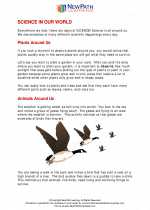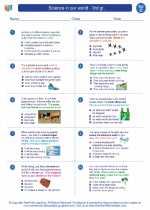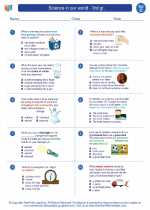Key Concepts:
- Gravity: Weight is the force exerted on an object due to gravity. The strength of gravity can vary depending on the mass of the objects involved and the distance between them.
- Units of Measurement: Weight is typically measured in pounds (lb) in the United States and in kilograms (kg) in most other countries.
- Mass vs. Weight: Mass is a measure of the amount of matter in an object, while weight is the force of gravity acting on that mass. An object's mass remains constant regardless of its location, while its weight can change depending on the strength of the gravitational pull.
- Balance and Scales: Weight is often determined by using a balance or a scale. A balance compares the weight of an object to a known standard, while a scale measures the force of gravity acting on the object.
Study Guide:
1. What is weight?
Weight is the force of gravity acting on an object. It is a measure of how heavy an object is.
2. How is weight different from mass?
Mass is the amount of matter in an object, while weight is the force of gravity acting on that mass. Mass is measured in units such as grams or kilograms, while weight is measured in units such as pounds or newtons.
3. How is weight measured?
Weight is measured using a balance or a scale. A balance compares the weight of an object to a known standard, while a scale measures the force of gravity acting on the object.
4. Can weight change?
Yes, weight can change if the gravitational force acting on an object changes. For example, an object would weigh less on the moon than it does on Earth because the moon's gravitational pull is weaker.
5. What units are used to measure weight?
Weight is typically measured in pounds (lb) in the United States and in kilograms (kg) in most other countries.
.◂Science Worksheets and Study Guides Third Grade. Science in our world - 3rd gr.

 Worksheet/Answer key
Worksheet/Answer key
 Worksheet/Answer key
Worksheet/Answer key
 Worksheet/Answer key
Worksheet/Answer key
 Worksheet/Answer key
Worksheet/Answer key
